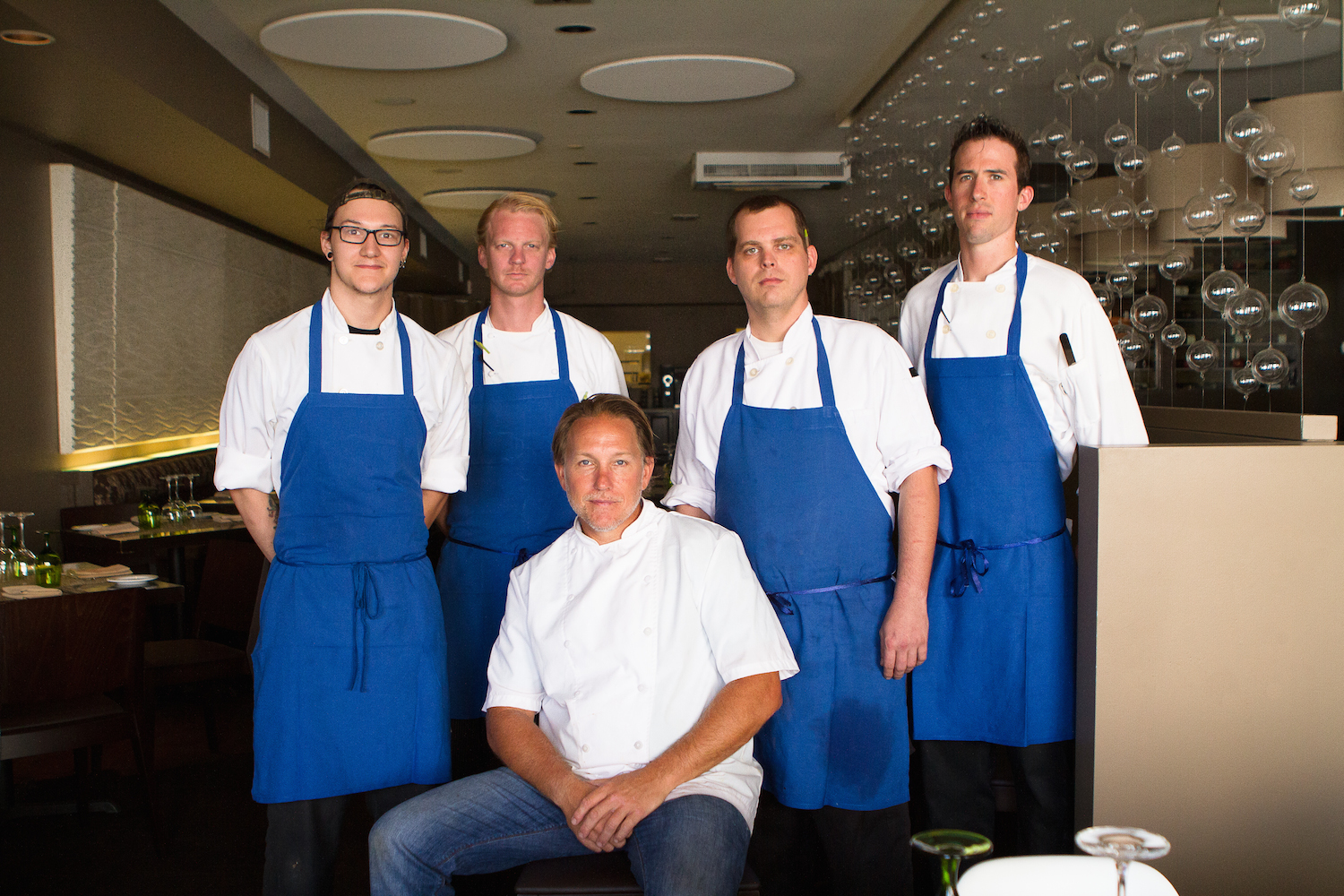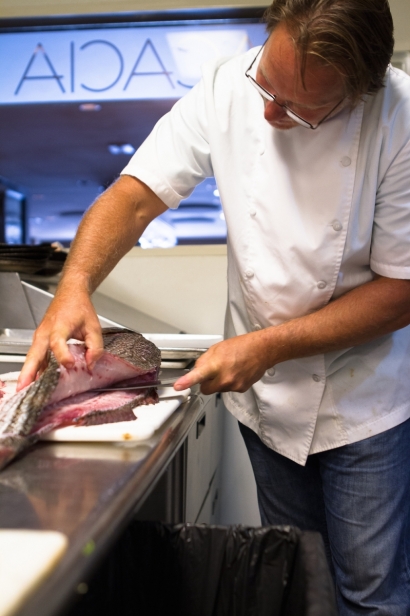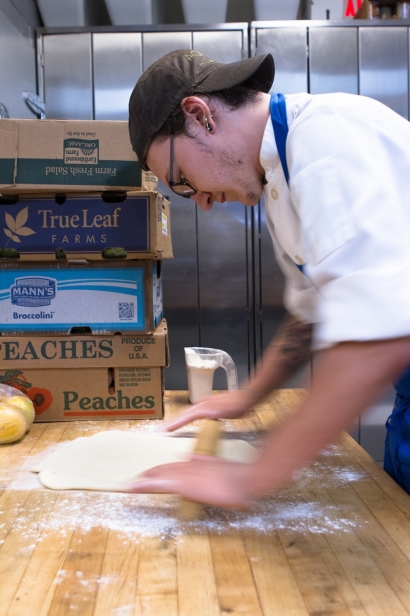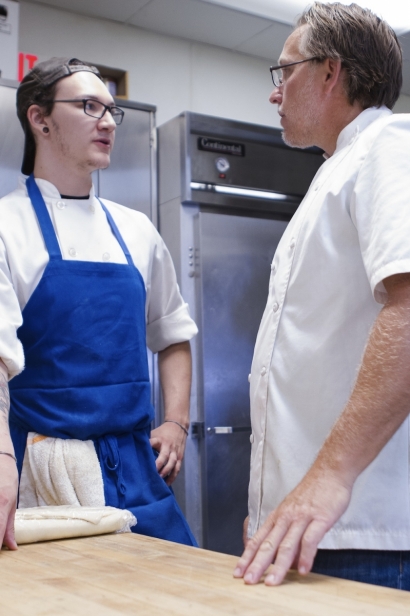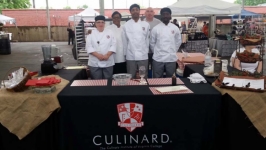Dale Reitzer's Chef School
Elsa composes a grilled romaine salad, arranging onions just so and dressing it with cheddar, mustard and bacon. “Pick up!” she shouts.
It’s Friday night, Fourth of July weekend. Some restaurants are running with B-team staff or closed altogether. Acacia Midtown isn’t just open, the executive chef and owner, Dale Reitzer, is working the line as I grab a stool in the corner to watch the evening’s service. His wife, Aline, is managing the front of house and their daughter Elsa, 13, is rocking the salad station while Cole, 10, runs food and works bread service.
“No one bitches about working holidays when my family and I are in the trenches with them,” says Reitzer.
If culinary school is varsity ball for rising chefs, then working the line in a decent joint is Division I. Here, Reitzer is the Bill Belichick (five-time Super Bowl–winning coach) of our booming restaurant league, and Acacia's kitchen is RVA’s farm system training chefs to lead teams of their own.
Reitzer’s awards are many: Food & Wine’s best new chef of 1999, four James Beard Award nominations over the past five years, and twice named Richmond Chef of the Year. Equally impressive are the accolades racked up by those who honed their craft at his side. Acacia's veterans include Phil Perrow (Dutch & Co.), Kevin Roberts (Perly’s), Thaddeus Enderle (A Sharper Palate) and Lee Gregory (The Roosevelt). Besides the slew of Elbys (Richmond Restaurant Awards) among them, Gregory has earned three of his own nods as a Beard Semifinalist.
“Follow the roots of the tree,” says Roberts, tracing Richmond’s chef lineage back through its training kitchens, “and you go straight from Jean-Louis Palladin [of The Watergate in D.C.] to Jimmy Sneed [who ran The Frog & The Redneck] to Dale.”
“I don’t hire you to be a cook. I hire you to become a great chef.”
–Dale Reitzer, Acacia
7:01 PM
The dining room is filling and the kitchen pace is quickening. Movements are efficient, but not rushed. It’s an orchestrated staccato. In the window, the line assembles entrées for table 71. Something isn’t perfect. Reitzer re-plates the duck and then the tangy ponzu sauce goes on.
“Pick up 71,” says the expediter. "Walking in: duck, no mushrooms. And a PPX, it’s Dr. Paul.” PPX is front of house speak for VIP, but back in the kitchen, egalitarianism rules. “Everything that comes out of the kitchen is equally important,” says one of the line cooks, fingering a delicate squash blossom like origami. “No station is more highly regarded than any other. It keeps everyone grounded.”
In many restaurants, it’s common for a cook to work one station for six months. “Sure, you know a lot about one thing,” Reitzer says. “But in my kitchen, you cook every veg of the season and every protein that walks, swims or flies.” The Acacia learning curve is especially swift because cooks don’t know where they’ll be night to night. Says the line cook, “You learn each station and how to leave it clean and prepped for the next guy.”
“He’s a Jedi,” says Phil Perrow of Dutch & Co. “He teaches what it takes to be a leader, a successful businessman: hard work, level head and patience. And he’s still doing it, he’s still behind the line.”
7:09 PM
It’s humming. All of the stations are abuzz with a brigade of blue aprons, yet Reitzer remains a placid white coat.
“Pick up,” an apron calls.
“It's not just cooking,” says Reitzer. “I show them how to talk to delivery drivers, accountants, lawyers, how to deal with the city, writing checks. They learn to understand money and value real fast.”
“Dale taught me that no one will cook your food better than you can,” says Lee Gregory of The Roosevelt. “Meaning, stay in the kitchen, do your job and leave your ego at the door. Respect the craft, respect your ingredients, go to work and grow up. We all needed that to some point.”
Back in Acacia’s kitchen, blue aproned Spencer cleans soft-shell crabs, separating them by texture. Super-soft “velvets” get sautéed; coarse-skinned “papers” get fried. “They’re crunchier,” he says. Spencer, 20, has been here three years. John, 31, has logged 10 years in restaurants, and almost a year at Acacia.
“The day I walked in for stage, I could see how tight everyone was,” John says, never taking his eyes off Elsa’s hands on the ahi ceviche. “It’s very rare to see the executive chef on this side of the line. He likes to touch everything.” John leans in to taste. “What are we looking for?” he asks Elsa. “Three things,” she replies: “salt, acid and spice.”
“God forbid your grits were lumpy. A golf ball of grits would pelt you in the chest from across the line.”
–Kevin Roberts, Perly’s
7:31 PM
The kitchen is flying. Dale has every burner going but he’s mum. There’s no radio, no TV; it’s all business, but joyfully so as tongs and pans dance. Crab cakes cycle from fridge to oven to plate. These babies are bigger than juicy burgers in a dive bar. “You’ve got to feed people,” he says, his first sentence in 20 minutes.
I heard exactly the same words from Lee Gregory a few days later during fried chicken night at The Roosevelt. “Feed people. They want value,” he said. “I learned that from Dale.” Too many diners have left fancy bistros hungry and broke, but not in any restaurant run by these two. Acacia’s everyday $25 three-course prix fixe may be the best deal in the city, as long as you don’t mind the menu evolving throughout the night as fish gets sold.
“Rockfish, snapper, black grouper—we get all our fish whole and break it down ourselves,” says Reitzer. This is not standard practice around town. “I even give Lee shit for that.”
7:37 PM
“Pick up,” Cole shouts. Ten tickets are active in the window. Fried green tomatoes pop as flames fly from a shaken sauté pan of golden-brown velvets. The dishwasher restocks with gleaming pans and fresh china.
“Fire duck no mushrooms,” a cook says. At the salad station, Elsa and two blue aprons are in full swing.
Papa Dale, the quarterback, touches and flips and keeps his cool. Cole snatches an order from the window. “Make sure when you grab the plates that you’re not too fast,” his father says. “Don’t want stuff to move around.” Cole nods, recognizing that he’s not being scolded, he’s being schooled.
Reitzer, 48, started in this business at 15 and graduated from Johnson & Wales culinary school in Norfolk. Before that, he grew up on a SEAL team base; his dad was in the Navy. “But Mom’s the ballbuster,” said Dale. “She cut no slack and I grew to have a thick skin. In those days, we were all free-range. If you wanted to gather kids for a game, you had to learn leadership.” Reitzer clearly learned how to corral his free-range playmates, a skill that plays well in restaurant kitchens.
“I catch myself sometimes, especially when I’m talking shit to someone, and think: ‘That’s so Dale, what just came out of my mouth.’"
–Phil Perrow, Dutch & Co.
7:45 PM
A moment of calm. The range is half-clear, but the dining room is three-quarters full.
“Pick up,” Elsa shouts and resets her station. “Two prix fixe.”
Aline serves and clears and efficiently glides across the dining room in a long and elegant black dress with a spectacular, clavicle-spanning necklace that sparkles like chandelier crystals. With her hair pulled back taut, she looks like a model from a Robert Palmer video. You might not see her smile, but you certainly won't see her sweat. I'd long mistaken her unblinking purposefulness for standoffishness until I fully appreciated her responsibility: She's the stage manager making the whole Acacia production run without a hitch. Aline pauses in the kitchen to see if I’d prefer still or sparkling water.
7:59 PM
Like the hum of bees, you can hear the kitchen buzz rise and fall with stress. The hive is alive once more, but Reitzer is zen quiet. “I only talk when something needs to happen,” says Dale. “All the time, I’m just listening. When I hear a cook stutter, that’s when I step in or slow down to let him catch up.” But not right away. Putting his team in stressful situations is part of their training, he says. “Make them wide-eyed and get them comfortable being uncomfortable.”
Long before Acacia and A Sharper Palate, chef Thaddeus Enderle worked under Reitzer as a hamburger flipper at Jimmy Sneed’s restaurant, The Frog & The Redneck. “When Dale did raise his voice, he got your attention. He would push you to your limit. That’s how you learned to stretch yourself and achieve new things.” Enderle carried this into his own kitchen. “I put a lot of responsibility on people and see how they handle coming out of the weeds. Let people fix things and they learn.”
“Dale doesn’t candy-coat it. There’s a pipeline of graduates from CIA, but they don’t really know how to put their head down to peel shallots and dice onions for two hours.”
–Thaddeus Enderle, A Sharper Palate
8:24 PM
From front of house to back, valet to garde manger, Acacia Midtown is running at full tilt and it’s a beautiful thing. I slip the pen back into my bag and duck into the dining room. My wife is a sipping a craft cocktail and perusing the menu. Sometimes, you don’t order the sausage because you’ve seen the sausage being made. Tonight, I’m ordering the sausage—and by sausage, I mean crab cakes. Fish is my favorite protein, yet across all of the meals we’ve shared, my wife has never seen me order crab cakes.
“You're getting the crab cakes?”
Of course, I tell her, I know who's working the line. Funny thing is, in Dale Reitzer’s kitchen it probably doesn’t matter. Any blue apron, and Elsa too, would make it the same damn way.


